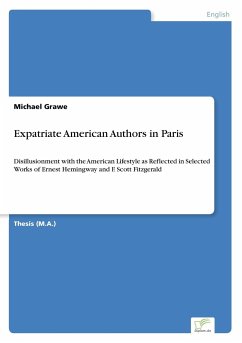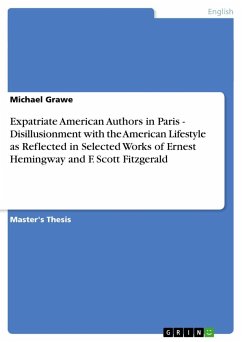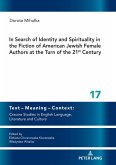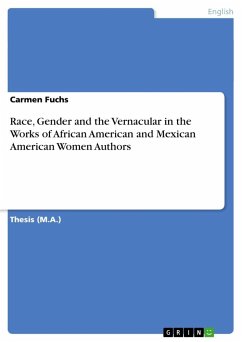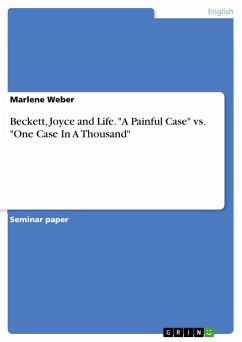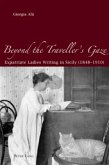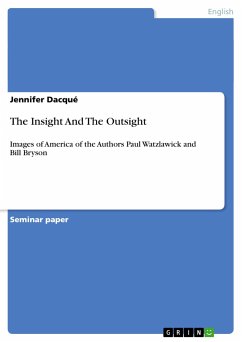Thesis (M.A.) from the year 2001 in the subject American Studies - Literature, grade: 1,7, University of Paderborn (3, Sprach- und Literaturwissenschaften), language: English, abstract: Inhaltsangabe:Abstract:
Paris has traditionally called to the American heart, beginning with the arrival of Benjamin Franklin in 1776 in an effort to win the support of France for the colonies War of Independence. Franklin would remain in Paris for nine years, returning to Philadelphia in 1785. Then, in the first great period of American literature before 1860, literary pioneers such as Washington Irving, James Fenimore Cooper, Henry Wadsworth Longfellow, Ralph Waldo Emerson, and Nathaniel Hawthorne were all to spend time in the French capital. Henry James, toward the close of the nineteenth century, was the first to create the image of a talented literary artist who was ready to foreswear his citizenship. From his adopted home in England he traveled widely through Italy and France, living in Paris for two years. There he became close friends with another literary expatriate, Edith Wharton, who made Paris her permanent home. Between them they gave the term expatriate a high literary polish at the turn of the century, and their prestige was undeniable. They were the in cosmopolitans, sought out by traveling Americans, commented on in the press, the favored guests of scholars, as well as men and women of affairs.
This thesis investigates the mass expatriation of Americans to Paris during the 1920s, and then focuses on selected works by two of the expatriates: Ernest Hemingway s The Sun Also Rises (1926) and F. Scott Fitzgerald s The Great Gatsby (1925). The specific emphasis is on disillusionment with the American lifestyle as reflected in these novels. The two books have been chosen because both are prominent examples of the literary criticism that Americans were directing at their homeland from abroad throughout the twenties.
In a first step, necessary historical background regarding the nature of the American lifestyle is provided in chapter two. This information is included in order to facilitate a better understanding of what Hemingway and Fitzgerald were actually disillusioned with. Furthermore, that lifestyle was a primary motivating factor behind the expatriation of many United States citizens. Attention is given to the extraordinary nature of the American migration to Paris in the twenties, as the sheer volume of exiles set it apart from any expatriation movement before or since in American history. Moreover, a vast majority of the participants were writers, artists, or intellectuals, a fact which suggests the United States during the 1920s was not a supportive environment for such people. Therefore, this study investigates the socio-political factors, and the disillusionment that resulted from America s involvement in World War I, which also motivated the exile. After that, the second part of chapter two examines the allure of Paris as a destination. It explains why the expatriates chose to gather in such large numbers in the French capital rather than in other European cities. The focus is on the development of an American literary expatriate community within Paris, detailing the amenities which the city offered, and the permissive environment that led Gertrude Stein to declare: Paris was where the twentieth century was. In addition, this section looks at the changes which occurred in the expatriate community during the 1920s. The chapter concludes with information about some of the important members of the American literary sphere in Paris.
Biographic information on the early lives of Ernest Hemingway and F. Scott Fitzgerald is provided in chapter three. The purpose of this section is to illustrate the development of each author s respective personal disillusionment with the American lifestyle, and to recount the events which led them to leave the United States. Moreover, Hem...
Hinweis: Dieser Artikel kann nur an eine deutsche Lieferadresse ausgeliefert werden.
Paris has traditionally called to the American heart, beginning with the arrival of Benjamin Franklin in 1776 in an effort to win the support of France for the colonies War of Independence. Franklin would remain in Paris for nine years, returning to Philadelphia in 1785. Then, in the first great period of American literature before 1860, literary pioneers such as Washington Irving, James Fenimore Cooper, Henry Wadsworth Longfellow, Ralph Waldo Emerson, and Nathaniel Hawthorne were all to spend time in the French capital. Henry James, toward the close of the nineteenth century, was the first to create the image of a talented literary artist who was ready to foreswear his citizenship. From his adopted home in England he traveled widely through Italy and France, living in Paris for two years. There he became close friends with another literary expatriate, Edith Wharton, who made Paris her permanent home. Between them they gave the term expatriate a high literary polish at the turn of the century, and their prestige was undeniable. They were the in cosmopolitans, sought out by traveling Americans, commented on in the press, the favored guests of scholars, as well as men and women of affairs.
This thesis investigates the mass expatriation of Americans to Paris during the 1920s, and then focuses on selected works by two of the expatriates: Ernest Hemingway s The Sun Also Rises (1926) and F. Scott Fitzgerald s The Great Gatsby (1925). The specific emphasis is on disillusionment with the American lifestyle as reflected in these novels. The two books have been chosen because both are prominent examples of the literary criticism that Americans were directing at their homeland from abroad throughout the twenties.
In a first step, necessary historical background regarding the nature of the American lifestyle is provided in chapter two. This information is included in order to facilitate a better understanding of what Hemingway and Fitzgerald were actually disillusioned with. Furthermore, that lifestyle was a primary motivating factor behind the expatriation of many United States citizens. Attention is given to the extraordinary nature of the American migration to Paris in the twenties, as the sheer volume of exiles set it apart from any expatriation movement before or since in American history. Moreover, a vast majority of the participants were writers, artists, or intellectuals, a fact which suggests the United States during the 1920s was not a supportive environment for such people. Therefore, this study investigates the socio-political factors, and the disillusionment that resulted from America s involvement in World War I, which also motivated the exile. After that, the second part of chapter two examines the allure of Paris as a destination. It explains why the expatriates chose to gather in such large numbers in the French capital rather than in other European cities. The focus is on the development of an American literary expatriate community within Paris, detailing the amenities which the city offered, and the permissive environment that led Gertrude Stein to declare: Paris was where the twentieth century was. In addition, this section looks at the changes which occurred in the expatriate community during the 1920s. The chapter concludes with information about some of the important members of the American literary sphere in Paris.
Biographic information on the early lives of Ernest Hemingway and F. Scott Fitzgerald is provided in chapter three. The purpose of this section is to illustrate the development of each author s respective personal disillusionment with the American lifestyle, and to recount the events which led them to leave the United States. Moreover, Hem...
Hinweis: Dieser Artikel kann nur an eine deutsche Lieferadresse ausgeliefert werden.

